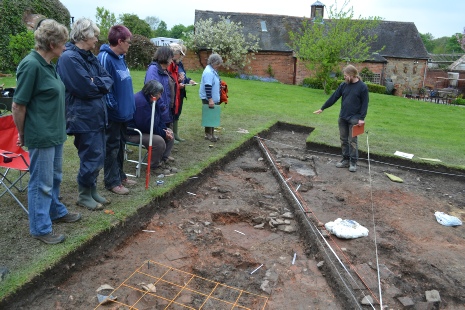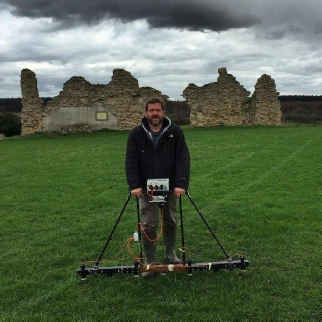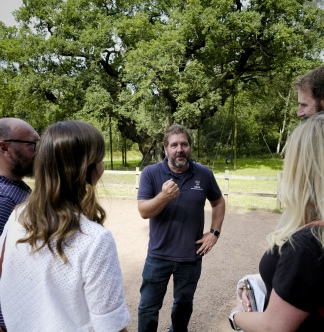Our expertise and focus is on the archaeology of the East Midlands, with our staff possessing a large amount of archaeological experience in this region.
We believe the best way to make real advances in the overall understanding of an area is to specialise in that area; and to try to maintain a continuity of knowledge and experience in the staff working in that area.
Such a commitment allows Mercian Archaeological Services CIC to set a number of long term research goals which could not be addressed within the scope of a single project.
Currently, understanding the post-
We also have expertise in post excavation analysis, particularly finds processing and analysis.
Mercian Archaeological Services CIC is an Affiliate Member of the Council for British Archaeology.
We undertake to abide by all relevant professional archaeological codes of practice and standards and guidance, including those of the IFA and English Heritage.
We are committed to the full dissemination of the results of all our work, and to the lodging of the information with the relevant repositories.
Full publication of our work is essential and we consider it a priority to publish everything promptly; both for an academic audience but also in more accessible formats such as the Internet, magazines, leaflets, and newspaper articles in order to ensure the widest possible dissemination.
Mercian never undertake archaeological works without reporting to the required levels, and believe that reporting is a fundamental requirement of the profession. Reports are one of the ways in which a company’s ethos and professionalism can be judged and Mercian always strive to produce reports of the highest standard in order to meet our aim of producing quality research.
A community interest company (CIC) is a new type of company introduced by the United Kingdom government in 2005 under the Companies (Audit, Investigations and Community Enterprise) Act 2004, designed for social enterprises that want to use their profits and assets for the public good.
Community Interest Companies (known as C.I.C.’s) are one of the fastest growing community oriented enterprise movements in the country. Roughly 1 in every 200 new companies last year was a CIC, and as of August 2014 there are almost 10,000 CICs on the Regulators register.
CICs can vary from small ‘kitchen table’ type organisations, to multimillion pound turnover organisations employing thousands of people. They can be set up as both Company Limited by Guarantee and Company Limited by Shares, and are often described as Mutuals or Social Enterprise.
Co-
The CIC legislation was introduced as a legal form under the Companies Act 2006 and subject to that Act and company law generally.
The primary core features of any company holding CIC status are two fold;
-
-
Both of these features are regulated by the Community Interest Company Regulator via an annual report, known as the CIC34, which is submitted to the Regulators office on an annual basis. The Community Interest Company Regulator’s office is a part of Companies House and governed by The Department for Business, Innovation and Skill – BIS.
https://en.wikipedia.org/wiki/Community_interest_company
Mercian Archaeological Services CIC are a private company, and we operate as a private entity, but we are founded on a community basis.
The company and its work is privately owned, but we seek to benefit the community and to provide community opportunities to people in-
Mercian are not a public body, or a charity, but as a CIC we do have a community aspect that, and our status has been awarded due to the community focus of our work.
As a Community Interest Company we re-
Mercian Archaeological Services CIC are a Community Archaeology company and as such we seek to involve the community in as many aspects of our work as possible.
It is also to conduct archaeological research within the East Midlands which provides genuine benefit to local communities; helping them to engage with, explore and understand their heritage.
We also provide training and education; developing transferable skills useful across society, and helping personal development and well-
Projects are designed to foster relationships within and between communities.
We believe it is critical that our research benefits the wider archaeological community.
We therefore seek to undertake projects that address key research questions highlighted as priorities by the regional and national archaeological community.
Our work is driven by a strong focus towards involving volunteers from local communities at all stages (where appropriate) of the work; and sharing our knowledge with them.
Our staff have many years of professional archaeological experience undertaking, supervising and directing Community Archaeology projects.
Mercian are a company of archaeologists who specialise in the archaeology of the region, providing the excellent knowledge and skills to our customers.
About
We are a Community Interest Company, and an independent Research company, who provide archaeological services, and specialise in Community Archaeology, Public Involvement, and Training.
Our mission is to create a new way of undertaking sustainable archaeological research in the 21st century.



Links:
-
–-
-
–-
-
-
-
–––––––––––––––––––––––
–––––––––––––––––––––––
––––––––––––––––––––––-
––––––––––––––––––––––-
—-
—-
—-
Mercian publish interims of all their work annually in the Transactions of the Thoroton Society Short Reports.
Reports for clients are published promptly in line with contractual agreements for delivery.
For long term self funded research projects; such ongoing research projects at King John’s Palace in Sherwood Forest http://www.mercian-
Full reports for long term projects are published at the end of the research projects in line with the standards and guidance of the Institute for Archaeologists.
Mercian Archaeological Services CIC are fully insured for all work undertaken; including Public Liability, Employers Liability and Professional Indemnity.
Staff are qualified Emergency First Aid at Work Certificate holders.
All Mercian staff have up to date DBS certificates
At Mercian Archaeological Services CIC, we have brought together some of the most experienced and talented community archaeologists in the region to provide the best heritage and educational opportunities available.
We are a dedicated and skilled team of archaeologists with knowledge based in the local area, who are passionate about researching and promoting the heritage of the region.
The team also has skills in education, outreach, training, project management, funded project delivery, community archaeology, and working with people of all ages and from all walks of life.
The Team:
–––––––––––––––––-
–––––––––––––––––-
–––––––––––––––––-
–––––––––––––––––-
Scroll down or click on the names on the left to meet the team.
David Budge
Company Director,
Post-
Archaeologist and Finds Specialist
Sean Crossley-
Company Director and Archaeologist
Sean started off in archaeology as a mature student and has worked in the profession since the late 1990s.
He has large amounts of experience of archaeological fieldwork, having worked for a variety of commercial units and an archaeological consultancy, around the East Midlands and UK including London.
Sean has also worked as a Freelance Archaeological Consultant prior to becoming a Director with Mercian.
Through this work he has gained large experience of urban and rural sites working with complex stratigraphy and sites from all periods.
Sean is responsible for Mercian’s Health and Safety (including Risk Assessments) and site logistics, and brings with him a large amount of business experience.
He is Mercian’s publications editor.
Sean has experience of community archaeology; leading excavation, training, and supervising volunteers.
He has also been involved himself as a volunteer on projects around the region as well as having experience of excavation overseas, and has acted as Archaeological Consultant to various community and archaeology groups.
He has an interest in the Roman period and Roman Archaeology, and also has a particular interest in the Roman Archaeology of Yorkshire.
Alongside his archaeological work Sean has been actively involved in the work of Nottingham Dyslexic Support having served as chairman and as a committee member for many years.
Andy Gaunt, MA, BSc (Hons), CertHE, FGS.
Company Director and Archaeologist
Landscape Archaeology, GIS, Survey and Geomatics
Andy’s main specialism is Landscape Archaeology.
As a Landscape Archaeologist Andy combines knowledge from a wide spectrum of disciplines including philosophy, art, music, literature, geology, historical and cultural geography, skyscape archaeology, archaeoastronomy, anthropology, toponomics, and more, to study the human experience of landscapes over time, and the impact of these elements on landscapes and the way they developed.
He is particularly interested in how human thought and the major movements in human culture have shaped landscapes over time-
He is recognised for his knowledge of Sherwood Forest, its landscape, people and medieval administration and has research interests in medieval archaeology, the medieval landscape; settlement, elite and designed landscapes, medieval forests, parkland and hunting landscapes, medieval hunting, medieval romance literature and chivalry, and the medieval legends of Robin Hood. He has spent many years investigating the settlement and landscape of Clipstone and Sherwood Forest in the Medieval period. Notably, he identified medieval Clipstone as a designed hunting and Arthurian romance landscape, and is also undertaking research into the development of the Sherwood Forest landscape as a whole from prehistory to modern times.
As a landscape archaeologist he is responsible for Mercian’s geophysical survey, topographic survey, fieldwork and training, and geographic information systems (GIS), LiDAR analysis, research and training.
Alongside his archaeology qualifications and Masters Degree in Landscape Archaeology, GIS and Virtual Environments, he has an Honours Degree in Geology and Geography (BSc), and is an elected Fellow of the Geological Society of London (FGS).
He regularly talks and presents on archaeology to local groups and at conferences, and is passionate about teaching and education.
He has made a number of TV appearances as an expert including on Channel Four, Channel Five, ARTE (France & Germany), BBC Breakfast, BBC East Midlands Today, and NottsTV.
He recently appeared in the Channel 5 series “Digging up Britain’s Past”, where he was interviewed about the archaeology of King John’s Palace, and the history and landscape of Sherwood Forest. He has also acted as an episode consultant to Channel Four’s ‘Walking Through History’ offering expert advise and location knowledge, as well as being interviewed by Tony Robinson at King John’s Palace and the Parliament Oak.
He has acted as an independent site consultant to Channel Four’s Time Team at King John’s Palace, in Sherwood Forest.
He has also been interviewed a number of times on BBC Radio 4 including the ‘Making History’, and ‘You and Yours” shows, and provided consultancy for BBC Radio 3.
He has been interviewed by the national and international press including the Guardian newspaper, and the New York Observer, and the archaeological press including Current Archaeology, Heritage Daily, and Archaeology Magazine (USA).
He has also provided expert comment and interview on local radio including: Radio Nottingham, Radio Leicester, and local press including The Nottingham Post, Mansfield Chad Newspaper, and the Sherwood Life Magazine.


David is Mercian’s finds expert; in charge of Mercian’s post-
David is a Post-
He is also well known for his knowledge of lithics (worked flint and other types of stone). He is our finds ‘expert in the field’. With an excellent all-
He writes all of Mercian’s finds reports and writes specialist Finds reports for other Archaeological Units and providers.
David trains delegates in all aspects of finds processing including archaeological finds drawing, finds identification, labelling, sorting, and quantification techniques. He runs workshops on prehistoric flint knapping techniques and identifying worked flint for archaeologists.
He has been interested in archaeology from a young age, and got his first experience of excavation with the Derbyshire Archaeological Society as a volunteer. He has worked as a professional archaeologist since the late 1990s. During this time he worked for a variety of commercial units and with the archaeology section of Nottinghamshire County Council. He was also assistant Historic Environment Record Officer for Nottinghamshire.
David has written a book on Stone Age Nottinghamshire (with a chapter on the Neolithic by Dr Chris Robinson) and published a variety of papers in archaeological journals.
His skills have been utilised by various museums (including Nottingham University Museum and Mansfield Museum) and groups to work with artefact collections.

All staff are in possession of up-
_____________________________________________________________________
For general enquiries please email:

Join our mailing list and receive information about upcoming opportunities and events, please email:
Please note -
You can unsubscribe from the mailing list at any point by emailing the same address and requesting removal of your email address and details. Please see the Privacy Policy below for more details.



Mercian Archaeological Services CIC: Privacy Statement
This statement is to confirm Mercian Archaeological Services CIC’s compliance with the newly enforced data protection legislation under the GDPR which is due to be carried out before 25th May 2018.
Mercian hold 3 forms of personal data:
1. Email
2. Details of payments
3. Physical data in the form of health and safety and onsite data processing forms etc.
1. Email:
Mercian holds a mailing list of email addresses, and associated names; consisting only of people who have explicitly confirmed their desire to be on our mailing list will be retained.
If you join our mailing list we will only contact you for reasons of legitimate interest to promote other products and services you have already declared a desire to receive.
We only retain names and emails on this list for the purposes of contacting people regarding products, events and services.
Mercian store your data in line with GDPR EU regulations, on password protected systems (email account and personal computers) and will only use it for the purpose of sending you information about the services you have entered into with Mercian.
Mercian do not pass on data to anyone else under any circumstances other than for legitimate business purposes e.g. accounting (we will ensure any thirds parties are also GDPR compliant), and legal requirements.
You have the right to withdraw your email address at any time – to do so, or to update our system with a more suitable contact, please let Mercian Archaeological Services CIC know by email on: info@mercian-
2. Payments:
When Payments for products are made online; Mercian retain details consisting only of name(s), address(es) and email address(es).
Mercian hold the above details in line with GDPR EU regulations, on password protected systems (email account and personal computers).
Mercian do not pass on data to anyone else under any circumstances other than for legitimate business purposes e.g. accounting (we will ensure any thirds parties are also GDPR compliant), and legal requirements.
3. Physical data in the form of health and safety and onsite data processing forms etc.
Hardcopy sign-
Should the company be dissolved; these documents will be destroyed after seven years.
Client medical/health details are stored on hardcopy paper sheets and are kept only for the duration of fieldwork, for use in the event of an emergency on site. These paper documents are kept with the relevant member of staff at all times on site or in a locked filing cabinet where there are site facilities.
These documents are not seen by any other party (except for the relevant emergency services at the point of contact).
These documents are destroyed securely at the end of fieldwork.
Mercian Archaeological Services CIC is a Private Company Limited by Guarantee.
We are a Community Interest Company -
Registered Office:
Staffordshire House
Beechdale Road
Nottingham
NG8 3FH
Registered Business No. 08347842.
We also have offices in Nottingham, Derby and Lincoln.
Community Archaeology in Derbyshire
Community Archaeology in Leicestershire
Community Archaeology Nottinghamshire, Excavation, Research, Volunteering, Community Archaeology Derbyshire, Training, Social, Learning, Community Archaeology Leicestershire, Heritage, Involvement, Belonging, Knowledge sharing, Community Archaeology Lincolnshire, Topographic Survey, Talks and Presentations, Outreach, Archaeology Projects , Open Days, Schools, Finds Processing, Day Schools, Field Schools, Young People, Archaeology and History of Sherwood Forest, Pottery Research, Medieval, Roman, Prehistoric, Community Interest Company, Community Archaeology Nottinghamshire.
Community Archaeology in Nottinghamshire
Community Archaeology East Midlands
Community Archaeology in Lincolnshire
Community Archaeology in Yorkshire
Mercian Archaeological Services CIC
Specialists in Community Archaeology, Public Involvement, Research & Training
© Mercian Archaeological Services CIC 2024. Registered Business No. 08347842. All Rights Reserved.








Community Archaeology Nottinghamshire, Community Archaeology Derbyshire, Community Archaeology Leicestershire, Community Archaeology East Midlands, Mercian Archaeological Services Community Archaeology for Nottinghamshire, Derbyshire, Sherwood Forest, Leicestershire and the East Midlands. Community Archaeology Nottinghamshire, Community Archaeology East Midlands, Community Archaeology Leicestershire. Archaeological
About us & Contact


